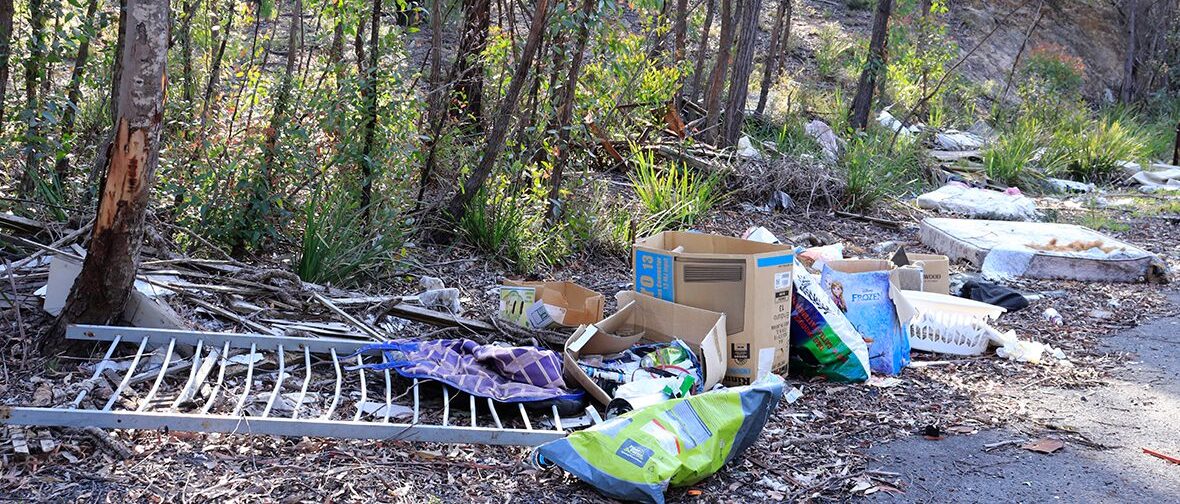The Hunter region is predicted to experience increased extreme weather and natural disasters, with the effects of this already impacting the region. Many of the region’s communities are struggling to recover from the recent continual and combined impacts of more frequent and severe natural disasters.
When disasters strike, a significant and sudden increase in the volume of waste occurs. This places communities at risk of health impacts, overwhelms local infrastructure, has the potential to pollute local environments as well as placing additional financial burden on community services and Councils.
Project Objectives
- To enable the region to understand and prepare for waste generated by disasters (‘disaster waste’).
- To enable the diversion and recovery of materials from disaster waste and protect the region’s landfill
The project was split into two phases, the first phase, ‘Regional Analysis and Risk Assessment’ aimed to analyse and map current disaster waste material flows in the region and understand the region’s capacity for processing, handling, movement, storage, recovery and disposal of disaster waste. Phase I also worked to identify and understand waste related risk with each disaster type, including an estimation of potential waste volumes and composition, and consider their likelihood, scale and impact on waste management services and infrastructure.
Phase II, Regional Support Package, prepared a Disaster Waste and Resource Recovery Management Plan (DWRRMP) for the Region and each LGA. These plans will provide the guidance and framework for how the Hunter Region and Councils will prepare to handle, move, store, recover, and dispose of disaster waste. The supporting DRAFT Memorandum of Understanding (MOU) that will outline how Councils will collaborate recover and dispose of disaster waste in the region, during and after a disaster.
Project Deliverables
- Constraints maps for the region and LGAs that analysed and mapped disasters in the region such as floods, bushfires, storms, including East Coast Lows, tsunami, and earthquakes.
- Regional Risk Assessment that considers the impacts from disasters and what mitigations could be applied to reduce these risks.
- Material flow analysis (MFA) to understand what currently happens to disaster waste in the region.
- Type V Materials Composition Matrix that aims to predict composition and volume of waste based on disaster type.
- Multi Criteria Analysis (MCA) Tool to enable the assessment of temporary disaster waste transfer sites against recommendations in the NSW Disaster Waste Sub Plan.
- Regional and LGA Disaster Waste and Resource Recovery Management Plans and quick reference Plan on a Page.
- Draft Memorandum of Understanding (MOU) to outline how councils will collaborate during and post disaster.
- Prevent Prepare Response Recovery (PPRR) Flowchart demonstrating where the Disaster Waste and Resource Recovery Management Plan fits within the PPRR Framework.
During both phases the project worked to identify appropriate potential temporary transfer sites in the region, in consultation with the NSW Environment Protection Authority (EPA), to facilitate the storage, sorting, diversion, and/or disposal of waste from the Councils across the region.
These suggested temporary transfer sites were tested using the MCA Tool and two sites were identified to be put through for pre-approval. At the conclusion of the project, the pre-approval process was not sufficiently established, and any pre-approval of these sites will be tested outside of this project.
Please contact resilience@hunterjo.nsw.gov.au if you would like access to any of the following resources:
- Constraints Mapping
- Multi Criteria Analysis (MCA) Tool
- Draft Memorandum of Understanding
Want to know more
If you have any questions on our disaster resilience work or wanted to discuss future opportunities, reach out to resilience@hunterjo.nsw.gov.au
The Disaster Risk Reduction Fund is jointly funded by the Australian and New South Wales governments.
Although funding for this project has been provided by both the Australian and NSW Governments, the material
contained herein does not necessarily represent the views of either Government.










